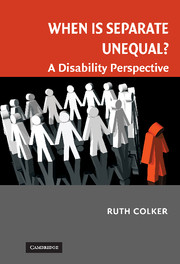
-
Select format
-
- Publisher:
- Cambridge University Press
- Publication date:
- 05 June 2012
- 17 November 2008
- ISBN:
- 9780511841187
- 9780521886185
- 9780521713818
- Dimensions:
- (228 x 152 mm)
- Weight & Pages:
- 0.57kg, 296 Pages
- Dimensions:
- (228 x 152 mm)
- Weight & Pages:
- 0.47kg, 294 Pages
- Subjects:
- Law: General Interest, Law, Human Rights
You may already have access via personal or institutional login- Subjects:
- Law: General Interest, Law, Human Rights
Book description
This book does not start from the premise that separate is inherently unequal. Writing from an 'anti-subordination perspective', Professor Colker provides a framework for the courts and society to consider what programs or policies are most likely to lead to substantive equality for individuals with disabilities. In some contexts, she argues for more tolerance of disability-specific programs and, in other contexts, she argues for more disability-integrated programs. Her highly practical investigation includes the topics of K-12 education, higher education, employment, voting, and provision of health care. At the end of the book, she applies this perspective to the racial arena, arguing that school districts should be given latitude to implement more use of racial criteria to attain integrated schools because such environments are most likely to help attain substantive equality from an anti-subordination perspective. The book measures the attainment of equality not on the basis of worn-out mantras but instead on the basis of substantive gains.
Reviews
"...When Is Separate Unequal? A Disability Perspective provides aframework for the courts and society to consider what programs or policies aremost likely to lead to substantive equality for people with disabilities....The book measures the attainment of equality on the basis of substantive gains..."
--PN Magazine
"In this important contribution to disability law and equality theory, Professor Ruth Colker challenges the current emphasis on formal equality and integration in the field of disability discrimination... Analytically rigorous and refreshingly pragmatic,When Is Separate Unequal? provides not only a thoughtful response to current disability discrimination theory, but also concrete guidance for policymakers, courts, and disability advocates who wish to put Professor Colker’s anti-subordination framework into practice."
--Harvard Law Review
Contents
Metrics
Full text views
Full text views help Loading metrics...
Loading metrics...
* Views captured on Cambridge Core between #date#. This data will be updated every 24 hours.
Usage data cannot currently be displayed.
Accessibility standard: Unknown
Why this information is here
This section outlines the accessibility features of this content - including support for screen readers, full keyboard navigation and high-contrast display options. This may not be relevant for you.
Accessibility Information
Accessibility compliance for the PDF of this book is currently unknown and may be updated in the future.


